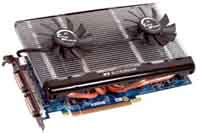 by congo » Tue Aug 24, 2004 10:50 am
by congo » Tue Aug 24, 2004 10:50 am
It depends.
You need to research what RAM is fitted to the card, it's the first important consideration. Not the amount of RAM, but the SPEED of the chips themselves.
Some budget manufacturers use el cheapo components on their cards, this may not make any difference, however, if the RAM fitted is a slower type, it makes a lot of difference. The RAM chips quality is based on it's timings specification, the faster the timings, (measured in nanoseconds ... ns) the better the chips and the faster the card will perform.
The nanoseconds (latency) should be as low as possible, the lower the number, the faster the RAM and therefore the card.
The difference RAM timings make is substantial, and a card with half the RAM, yet faster timings will outperform a card with more RAM and slower timings.
A cheap trick used by manufacturers is to stack on a heap of cheap RAM to fool the common man into believing he has something special.... so, when I hear people spouting off how much RAM they have on their video card, I know straight away they don't know what they are talking about...... if they did know, they would be quoting the RAM timing in nanoseconds instead.
If you look at the advertiser's specs at pricewatch.com you will often see the /ns specified, and it should be taken into account when purchasing or making price comparisons on video cards.
I hope that clears one or two things up for you.
It's this knowledge that has kept me from posting my PC spec in my Avatar, you see, it seems pointless to me to post a specification without a detailed configuration description as well. This will help to explain why 2 computers of apparent same specification will perform very differently in hardware alone, let alone software configuration.
While on the subject of configuration, You should also know that each video card has a "reference" specification. This spec is often modified within certain limits depending on the manufacturer of the hardware.
Certain architecture and components used will either make the card above or below spec. If the card is sufficiently above spec, the manufacturer may safely alter the GPU and RAM timings into an overclocked state without fear of stability or overstress problems.
Other manufacturers may experience stability problems and therefore underclock their cards to compensate.
There are just a few manufacturers who have a track record of producing consistently fast cards because they use the best components and strive to serve a niche market of enthusiasts. Gainward is one of those, XFX is making their mark, others have produced some very nice cards.
Video card selection for most is but a hit and miss affair, most advice is based on ignorance at best. There is actually a lot of research and current knowledge required to make a good purchase decision when you realise what is involved.
But, then comes along a product line like the NV6800 which just blows everything else away and it all becomes easy again........
Last edited by
congo on Tue Aug 24, 2004 11:24 am, edited 1 time in total.

Mainboard: Asus P5K-Premium, CPU=Intel E6850 @ x8x450fsb 3.6ghz, RAM: 4gb PC8500 Team Dark, Video: NV8800GT, HDD: 2x1Tb Samsung F3 RAID-0 + 1Tb F3, PSU: Antec 550 Basiq, OS: Win7x64, Display: 24&



 Mainboard: Asus P5K-Premium, CPU=Intel E6850 @ x8x450fsb 3.6ghz, RAM: 4gb PC8500 Team Dark, Video: NV8800GT, HDD: 2x1Tb Samsung F3 RAID-0 + 1Tb F3, PSU: Antec 550 Basiq, OS: Win7x64, Display: 24&
Mainboard: Asus P5K-Premium, CPU=Intel E6850 @ x8x450fsb 3.6ghz, RAM: 4gb PC8500 Team Dark, Video: NV8800GT, HDD: 2x1Tb Samsung F3 RAID-0 + 1Tb F3, PSU: Antec 550 Basiq, OS: Win7x64, Display: 24&


